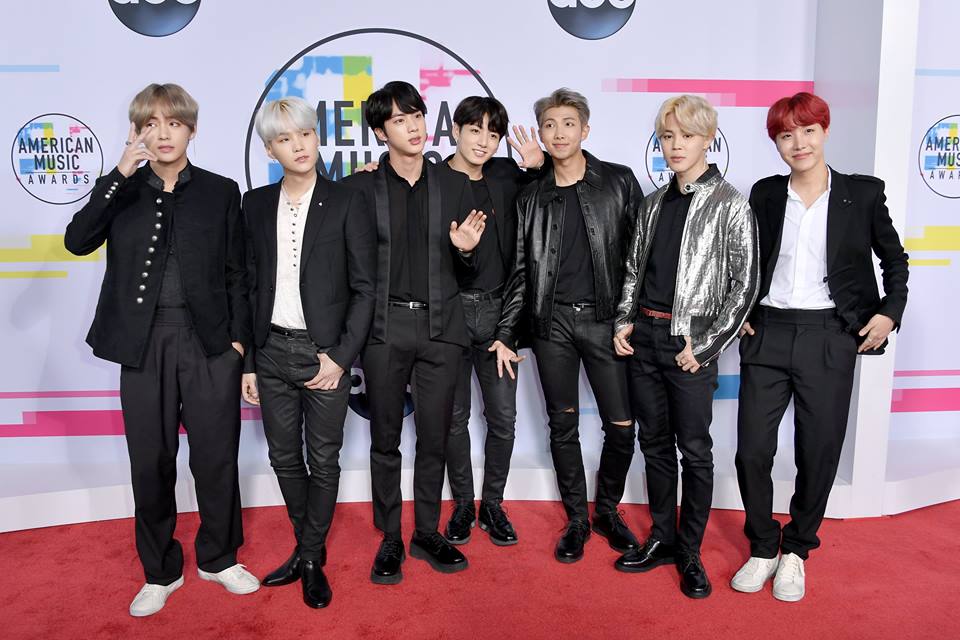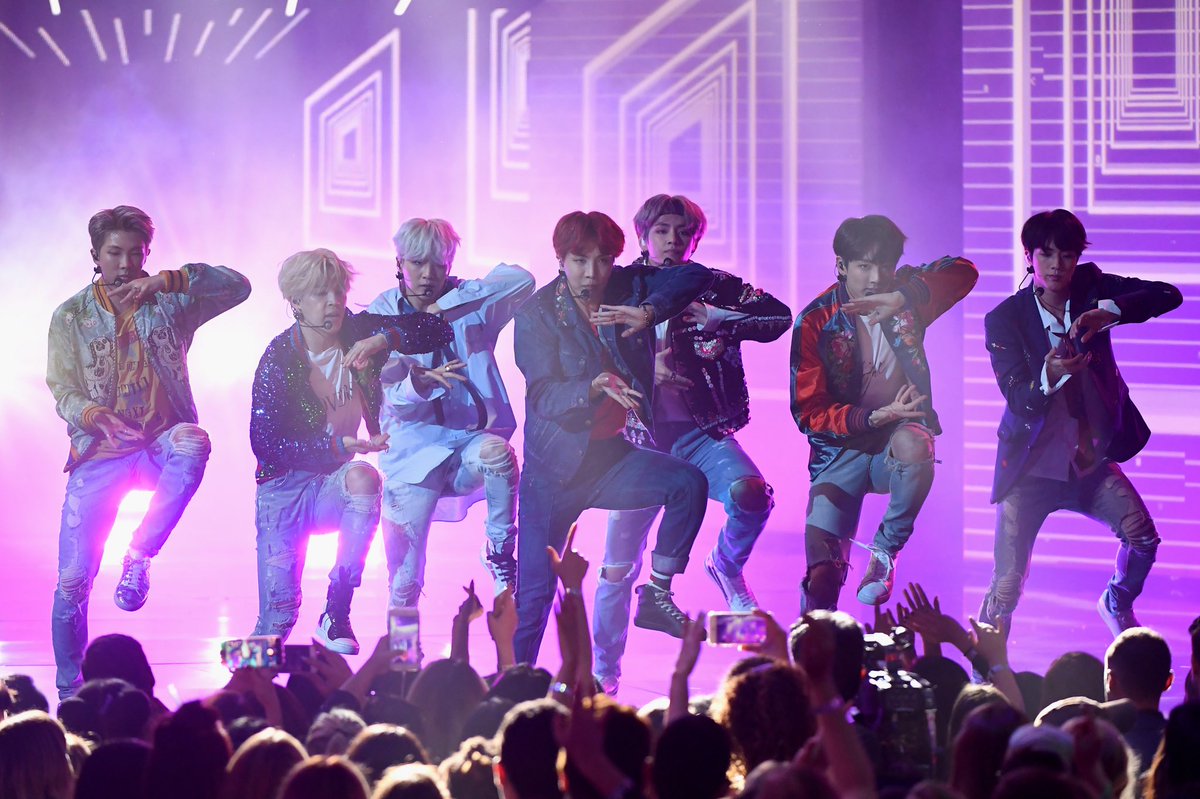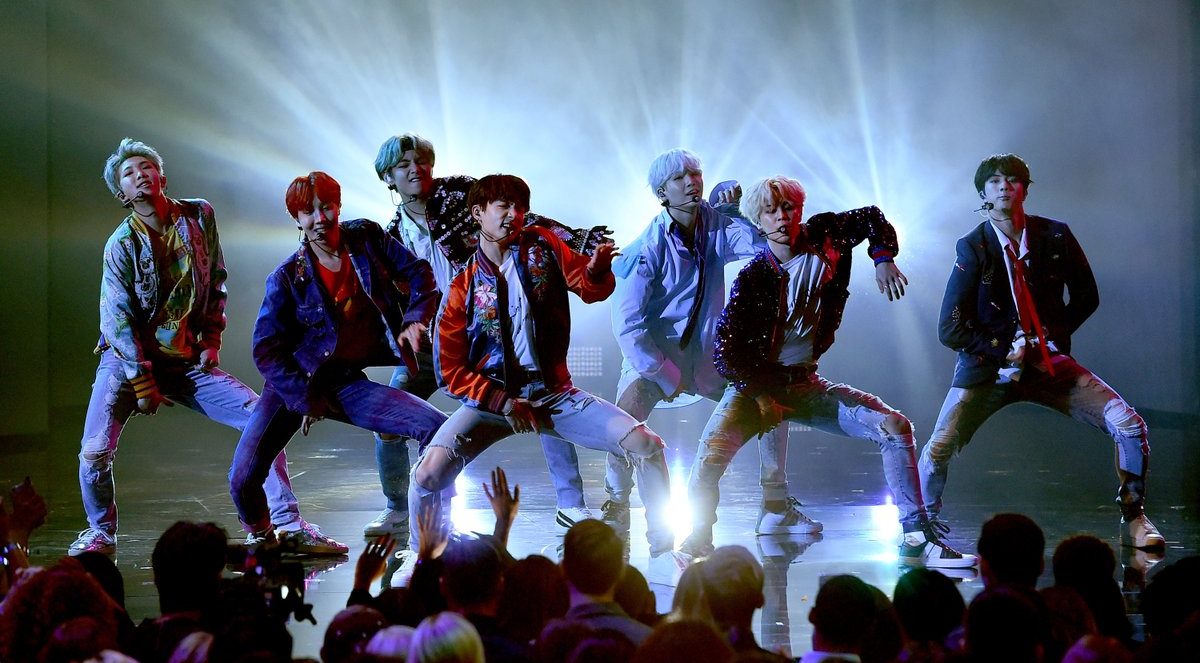It’s been a long time coming for K-pop fans, especially the ardent fans of boy band BTS. In May, the group snatched up the Billboard Music Award for Top Social Artist, beating out stateside mainstays like Selena Gomez, Ariana Grande, Shawn Mendes and Justin Bieber. Their win served as a prelude to their biggest moment in the American spotlight yet–a full performance at the American Music Awards this past Sunday.
When I watched this performance live, I felt like the reaction the entire crowd had must have been what it was like for audiences to see The Beatles for the first time in the 1960s. There was a different energy building up to the performance, and that energy kept building throughout. It was eye-opening for me, and it should have been eye-opening to any concert promoters, stadium owners, and record labels. BTS is ready to explode onto the American scene.
But, despite BTS and other K-pop groups and solo artists having intense fans that span age groups, social classes and racial lines in America, American mainstream music coverage has largely steered clear of giving these artists press. Now, thanks to the electric AMA performance, America has to reckon with the power of not only BTS, but Asian pop stars as a whole.
The musical glass ceiling

K-pop and Asian singers in general have had it tough finding success and respect in America. Even when BTS won their Billboard Award, there were viewers (seemingly mostly superfans of the losers) who delved into racist, xenophobic rhetoric because their fave lost. The general consensus of these superfans, according to Paste Magazine‘s Martin Tsai, was that BTS stick to Korea.
“Of course, the two Canadian nominees in the category (Bieber and Mendes) have eluded this knee-jerk outrage and xenophobia, as has just about every Brit in American pop history from the Beatles to One Direction,” he wrote. “It’s the type of blowback that ensues whenever a person of color upsets the cultural status quo—as when Barack Obama first ran for the presidency, when Jeremy Lin first played for the Knicks, or when Takuma Sato won this year’s Indianapolis 500 and prompted the now-fired Denver Post sports writer Terry Frei to tweet how that made him ‘uncomfortable.’ Indeed, the American soundscape has proven to be a final frontier for Asians and Asian-Americans to find their footing.”
Tsai writes about how many Asian and Asian-American singers have tried their turn at breaking into America’s discriminatory music industry with varying degrees of success. Kyu Sakamoto’s “Sukiyaki,” for instance, is the only Billboard Hot 100 chart topper by an Asian singer, and that was in 1963. (The song later became a hit for the group A Taste of Honey, who covered it in 1981, yet another chapter in the push-and-pull between black and Asian diasporic experiences in America.)
The crossover hit most people remember with some freshness is Psy, whose “Gangnam Style” became a viral sensation. However, his follow-up single didn’t do near as well, and for many in America, “Gangnam Style” was always seen, as Tsai describes, “a novelty song.” Psy’s appearance, for better or worse, also helped him gain short-lived success in America; unlike BTS, who are young and look and behave like living Ken dolls, Americans saw Psy with the same stereotypical lens used on most Asian men–Psy is goofy, funny and, to the audience, seemingly unaware of why he’s seen as such, which makes him more of a target for racial stereotypes. (However, Psy a bad boy jokester-critic in Korea, is the complete opposite of “unaware”; he was America’s Favorite Asian until word got out about how Psy had performed songs protesting the U.S. military, particularly over the beheading of a Korean missionary by Islamic extremists in Iraq. Even “Gangnam Style is a protest song of sorts, criticizing the upscale Seoul neighborhood Gangman’s needless opulence and materialism.)
Psy’s success in America does, sadly, hinge partially on the goofy stereotype he was able to fill. Think back to American Idol–out of the number of Asian contestants that have tried out, how many do you remember as being 1) actually good 2) actually handsome and 3) actually taken seriously? The closest to ever reach the level of being taken as a legit artist was Anoop Desai, and even then, the judges (and the coaches, quite frankly) weren’t ever sure of what mold he should belong to. When he did sing his preferred genre, R&B, it was often taken as a surprise or even a joke. The cover he became known for, Bobby Brown’s “My Prerogative,” was looked at as part-sideshow, part-participation trophy. Despite the crowd (and Anoop’s hormonal fans) screaming for him, his performance was still seen as “Can you believe this Indian kid is gyrating and singing black music?”
Interestingly enough, I’ve actually interviewed Desai way back in 2009, sometime after his season’s American Idol tour ended. Back then, he said he had actually quit his degree in college and moved to Atlanta to pursue music full-time. I’d hoped we’d be able to see Desai on the big stage soon, promoting his own album. So far, not yet.
For what it’s worth, it seems like Asian artists are taken way more seriously on The Voice, in which your voice, not your looks, are what goes into you being picked. Take for instance Tessanne Chin, a Chinese-Jamaican artist who was able to release her second album and major release Count on My Love and sing for President Barack Obama. Or Judith Hill, a biracial Japanese-African American artist who had not only sung with Michael Jackson and was featured in the Oscar-winning documentary, 20 Feet from Stardom, but was able to release Back in Time, a CD produced by Prince after her stint on the show.
Still, what’s holding Desai back is the same thing that has held back many Asian and Asian-American artists–the stereotypes many music execs still have when it comes to Asian artists and Asians in general. In 2007, The New York Times profiled Harlemm Lee, a Detroit native of Chinese and Filipino descent who was looking to make it big as a singer. However, after landing a spot on 2003 NBC singing reality show Fame and gaining a record contract–his second in his music career, Lee never achieved the success he was hoping for. As of the time of the article, Lee was working as a secretary.
“In terms of finding an advocate in the industry, the Asian thing has been the critical factor,” he said. “You don’t fit.” On his MySpace page, he wrote, “I was told over and over again by countless label execs that if it weren’t for me being Asian, I would’ve been signed yesterday.”
Asian artists today: BTS and beyond

Thankfully, it seems like a groundswell of support for Asian artists has been building in America, possibly leading to BTS’ big AMAs moment. Buzzfeed’s Tanya Chen released a list of 21 Asian American artists music fans should know in 2013, including rapper Dumbfoundead, whose music video “SAFE” took on the movie industry’s whitewashing and discrimination against Asian actors.
NPR’s Mallory Yu wrote about this year’s SXSW Asian-American showcase, spearheaded by LA-based nonprofit Kollaboration. And last year, Splinter News declared K-pop star Eric Nam as the first K-pop artist to actually make it big in America. It’s important to note that Nam, like many American-born Asian superstars before him, had to go overseas to find fame back home; he’s originally from Atlanta, and as Isha Aran wrote, “has a cultural fluidity that–at least by American audiences–is rarely seen from K-pop stars.”
BTS is primed to be in a position to bust open the doors for all of the Eric Nams, Girls’ Generations, 21E1s, and Dumbfoundeads on both sides of the ocean, and the AMAs is just one of the biggest glass ceilings to crack.
I remember my mom talking about how she used to mark her calendar for video release dates by Britney Spears or *NSYNC, and wake up to watch MTV,” wrote Jordyn, a BTS superfan in Las Vegas, to The Fader‘s Owen Myers. “It was something I could never relate to, and I thought that it was lost on our generation. When I saw the first video from BTS, I finally understood what she meant.”
“They are terrific and the most popular K-pop band in the world right now,” said Susan Rosenbluth, senior vice president at Goldenvoice/AEG Presents, whose firm promoted BTS’ international “Wings Tour”, to Paste.
“I think if they wanted to cross over and do more, they will…I think it will take certain things like winning awards, being in the general-market eye, so to speak, by marketing their brand in the U.S. more, in Mexico more, in other parts of the world more than just on the internet, and by virtue of the music that they put out in the future. [If] they wanted to sing more in English, they could.”
From what the band has said in interviews, they are looking to put out more English-spoken content. And, if their breakout performance from the AMAs is any indication, we certainly haven’t seen the last of BTS in our neck of the woods.
Loved this article? Follow JUST ADD COLOR at @COLORwebmag and on Facebook!
